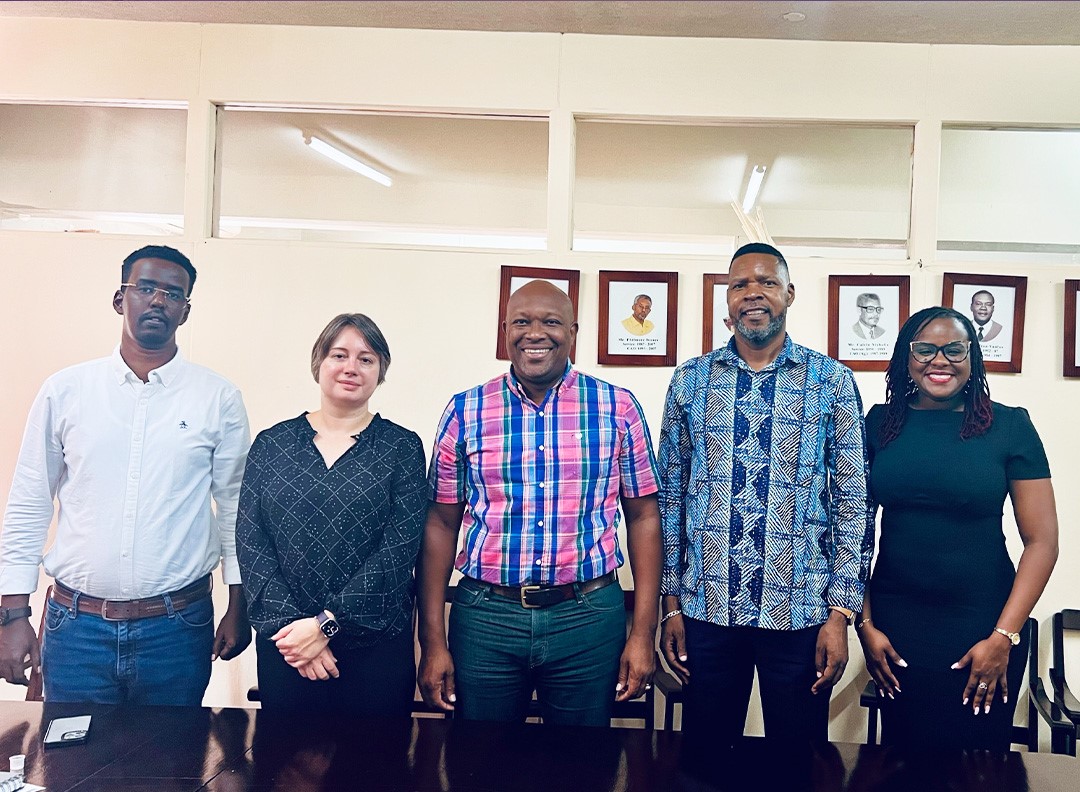
ILO Mission to St. Vincent and the Grenadines: Advancing Decent Work and Social Justice
September 22, 2025
A delegation from the International Labour Organization (ILO) has wrapped up a significant week-long mission in St. Vincent and the Grenadines from September 15-19,2025, aimed at strengthening engagement and deepening collaboration in the promotion of decent work and social justice for all Vincentians.
The team was led Dr. Joni Musabayana, Director of the ILO Decent Work Office for the Caribbean, and included Ms. Ingerlyn Caines-Francis, Senior Programme Officer, Mr. Abdelmalik Muhummed, Employment and Labour Market Specialist, and Ms. Vera Guseva, Workers’ Activities Specialist.
Throughout the visit, the ILO team held consultations with key stakeholders, including Prime Minister Dr. Hon. Ralph Gonsalves, Minister of Labour Hon. Saboto Caesar, Labour Commissioner Ms. Racquel Jacobs-Lawrence, UN Country Coordination Officer Ms. Lafleur Quammie, Director of the National Insurance Scheme Mr. Stewart Haynes, General Secretary of the National Workers Movement Mr. Noel Jackson, as well as representatives of the St. Vincent Public Service Union.
Discussions during the visit focused on rebuilding engagement with St. Vincent and the Grenadines, refining priority areas for support, and enhancing collaboration with the Organisation of Eastern Caribbean States (OECS). Additionally, the team aimed to identify opportunities to align efforts with the United Nations' programming in the country. Key discussions included the ILO's support for St. Vincent's 13th Actuarial Valuation and the exploration of establishing an Unemployment Insurance Scheme.
The ILO reaffirmed its dedication to fostering collaboration with St. Vincent and the Grenadines, ensuring that efforts to enhance living and working conditions are prioritized for the benefit of all citizens.
Check out the list of new employment opportunities here: https://dol.gov.vc/dol/index.php/employment
 On Thursday 21st April, 2022, the Labour Department, which falls under the Ministry of Agriculture, Forestry, Fisheries, Rural Transformation and Labour (MoA), hosted the virtual presentation of the Labour Market Analysis Training Manual.
On Thursday 21st April, 2022, the Labour Department, which falls under the Ministry of Agriculture, Forestry, Fisheries, Rural Transformation and Labour (MoA), hosted the virtual presentation of the Labour Market Analysis Training Manual.
The Labour Market Analysis Training Manual (LMATM) emerged out of a concerted venture to enhance technical capacities and underlying competencies of both prospective and existing labour market analysts across the various sectoral spaces of St. Vincent and the Grenadines (SVG).
Commissioned by the Department of Labour alongside its strategic partners and other stakeholders intimately connected to labour market planning and policy making, this LMATM represents the most comprehensive training guide and tool to be used for trainers and trainees in different types of training environments.
The presentation was conducted by lead consultant Mr. Dwayne Devonish of the University of West Indies, Cave Hill Campus. On May 16th -20th, 2022, Mr. Devonish would lead a series of training sessions with key stakeholders as part of the Labour Market Analysis and Training Consultancy.
This is a capacity building component of SVG Human Development Service Delivery (HDSD) Project which was implemented by the Government of St. Vincent and the Grenadines with the support of the International Development Association (The World Bank).
 On the Thursday 7th April, 2022, the 6th Meeting of Senior Officials with Responsibility for the Regional Labour Market Information System was held to review the conceptual design of the updated Labour Market Information System (LMIS).
On the Thursday 7th April, 2022, the 6th Meeting of Senior Officials with Responsibility for the Regional Labour Market Information System was held to review the conceptual design of the updated Labour Market Information System (LMIS).
Established in 2017, the Regional Labour Market Information System (RLMIS) is geared towards the proper management of the regime for the free movement of skilled labour, as enshrined in Article 46 of the Revised Treaty of Chaguaramas. This initiative is a collaboration with the International Labour Organisation (ILO) and the University of the West Indies (Cave Hill) and covers fourteen (14) Member states, of which St. Vincent and the Grenadines is included. Each Member State has a critical role to play in the implementation of the Regional LMIS, in particular the National Statistical Offices; the Ministry with the responsibility for Labour; and the National Insurance Agency.
The regional LMIS entails systematic collection of labour market data which would provide for evidence-based decision-making as it relates to national and regional policies in areas such as job creation and job security. These policies would help to address critical problems such as long-term unemployment and youth unemployment. Additionally, the implementation of such policies would lead to an improved labour market efficiency across CARICOM Member States and strengthen the Region's competitiveness. Each LMIS is built on a .Stat platform that would create an ease of use for all users; from data managers and providers to job seekers.
The principal labour marketing data-producing agencies of St. Vincent and the Grenadines are the Department of Labour (DoL) in the Ministry of Agriculture, Forestry, Fisheries, Rural Transformation, Industry and Labour, the Statistical Office (SO), and the National Insurance Services (NIS)
On the 30th August 2021, the heads of these agencies signed an Addendum to the Memorandum of Understanding (MoU) for the St. Vincent and the Grenadines Labour Market Information System (SVG-LMIS), in which they gave their firm commitment, to produce and disseminate labour market data and to collaborate to provide labour market analysis reports on a regular basis.
The Regional LMIS indicators for each agency are the following;
Statistical Office (SO): Labour Force Statistics & General Labour Market Statistics.
National Insurance Services (NIS): Occupational Health Statistics & Social Security Statistics.
Department of Labour (DOL): Public Employment Agency Statistics, Legal Framework & Non-national Worker and Overseas Placement Statistics
February 11, 2022

On Friday 4th February, 2022, the Labour Department, of Ministry of Agriculture, Forestry, Fisheries, Rural Transformation and Labour (MoA), hosted a workshop to facilitate the finalisation of the recently revised and updated Protection of Employment Act which include provisions for pandemics and natural disasters.
Under SVG Human Development Service Delivery (HDSD) Project which was implemented by the Government of St. Vincent and the Grenadines with the support of the International Development Association (The World Bank), the consultancy was awarded and presented by Barbadian, Mr. Rommel St. Hill, an International Legal Specialist.
Present at the workshop were Permanent Secretary of the Ministry of Agriculture, Forestry, Fisheries, Rural Transformation and Labour, Mrs. Nerissa Gittens, the featured speaker; Mr. Burns Bonadie, representatives from various trade unions, employment associations and the Department of Labour.
Mr. St. Hill is expected to present a final draft of the updated Protection of Employment Act to submit to the relevant authorities for approval and adaptation, based on the feedback provided by during validation workshop.

